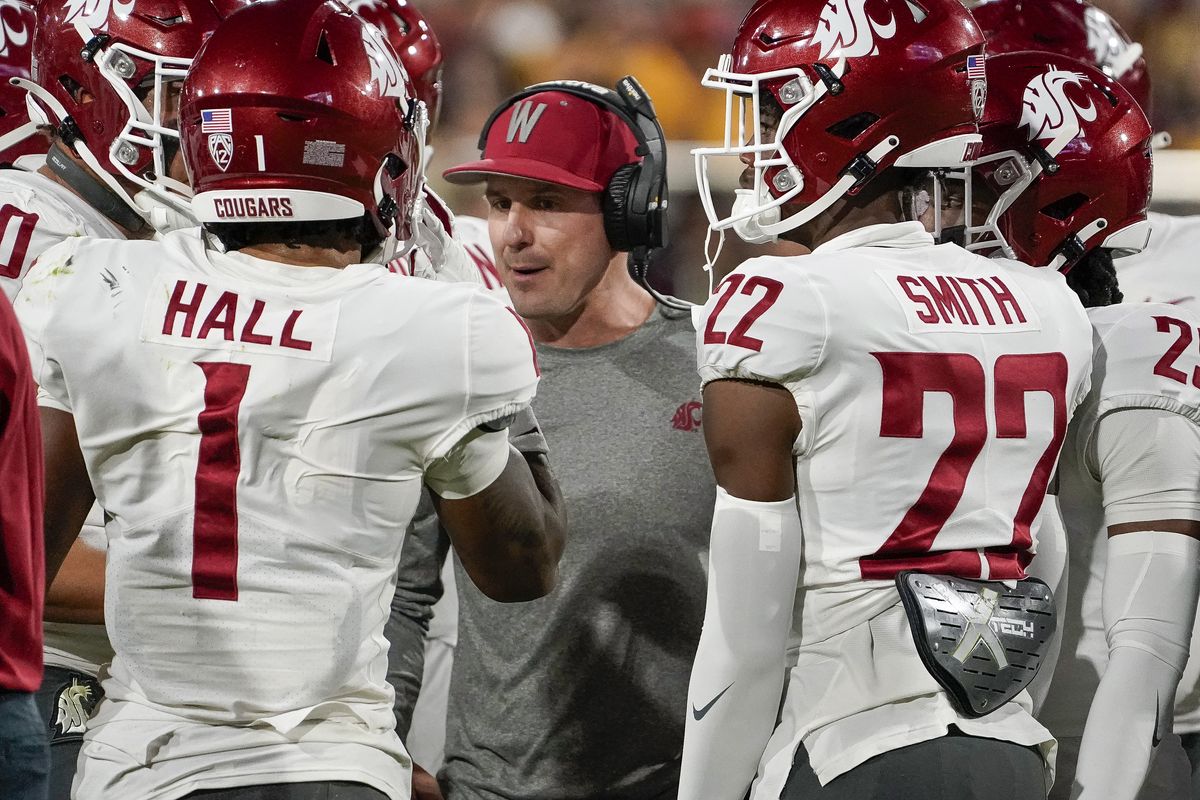How did WSU’s Jake Dickert keep roster turnover to a minimum? ‘It takes a team’

OAKLAND, Calif. – Weeks before Washington State’s football season ended, before the Cougars played their final game in the Pac-12 as we know it, Jake Dickert went public with one assertion.
“It’s going to be open-target season on our players,” Dickert said.
By that he meant the way representatives from other schools would surely try to lure his players away, using lucrative name, image and likeness (NIL) offers to ransack his team through the transfer portal. Dickert believed in his program, he said, but retaining players in this day and age isn’t always so simple.
So all the Cougs did was hold on to nearly all nongraduating seniors and maintain nearly their entire staff. Starting wideout Josh Kelly hit the portal and transferred to Texas Tech. Quarterback Cam Ward declared for the NFL draft, then veered course and committed to Miami. Those were the only WSU starters to hit the portal and transfer elsewhere.
In total, 18 Cougs hit the portal, which closed earlier this month. Outside of Ward and Kelly, WSU’s costliest loss might have been backup cornerback Javan Robinson, who transferred to Arizona State. After that, running back Jaylen Jenkins and wideout DT Sheffield each hit the portal, but both departed the program during the season, long before transfer season begun.
On the coaching staff, WSU lost only a couple of support staff employees. No major assistant coaches took jobs elsewhere, a change of pace from the last couple of seasons, when the Cougars lost coordinators over the winter.
It’s encouraging for the Cougs because, at least on the surface, several factors were lining up against them. They had just wrapped up a 5-7 season, missing a bowl for the first time in nearly a decade (outside of the pandemic-shortened 2020 season).
They may have scored a giant victory in court, securing the rights to the Pac-12, but as they try to rebuild the conference, they’re entering a temporary scheduling agreement with the Mountain West – a departure from the Power Five status the program enjoyed for so long.
All of which is why for Dickert, losing only two starters to the portal amounted to a promising development.
“Tremendous amount of pride,” Dickert said. “The biggest thing is, you gotta realize in today’s world, everyone chooses to be here. It wasn’t like that all the time. Everyone made a choice, right? So you gotta take advantage of it. That means they’re connected to it. It means they’re connected to our staff, which I think is vitally important, and the importance of all those guys in the room and how they’re doing it and what we’re doing. And they want to be part of this program. I don’t take that lightly at all.”
Central to that approach, Dickert said, is recruiting his own players throughout the season – not just on the day after the season ends and worry starts to set in.
“If you think you’re gonna recruit them all of a sudden when Dec. 1 hits, you’ve whiffed,” Dickert said. … “It isn’t just the front-line starters. It’s about maintaining competitive depth so you can put them through the developmental process. … Retaining the young guys is just as important as retaining the starters. But now it takes a team of people. It isn’t just me. It’s the program. It’s how you treat them. It’s the staff. It’s a whole community of people that help retain these players.”
The Cougs also suffered just one decommitment, which came from four-star prospect Trae Davis, who flipped from WSU to Kansas State in December. Otherwise, WSU signed a 25-man signing class in December, which has ballooned into the 30s thanks to transfers like former Oregon players Kris Huston and Keith Brown.
This time around the offseason, part of that process meant Dickert staying at WSU. Last week, when coaching changes happened with the departure of Washington coach Kalen DeBoer, Arizona’s job opened up and the Athletic named Dickert a potential candidate.
Dickert brings stability and structure to the WSU program, reporter Bruce Feldman wrote, which is part of what made him a promising candidate for the Wildcats’ opening. The same reasoning held last fall, after the Cougs bolted to a 4-0 start and Dickert’s name surfaced for the opening at Michigan State.
“There was never a conversation with Arizona, same as there was never a conversation with Michigan State,” Dickert said. “Anything that’s out there is noise until anything really happens. So didn’t pay it much credence. At the end of the day, it’s what we wanna do here at Washington State to be successful, and to me, it’s being better with the outside noise – including myself. I think at some point last year, I really felt a deep connection to be the voice for our university.”
That, Dickert said, is part of why he doesn’t feel pulled to leave WSU any time soon.
“I think coaches get themselves in trouble by overpromising,” Dickert said. “I love it here. This is my job. I’m investing in my job each and every day. If anyone could see the amount of hours and time that we all put in here … We just kept the whole staff here, maybe for the first time in a long time. So it just shows that we’re doing things right, and we never have taken shortcuts to create success.
“Any time opportunity comes up, just put your head down and just keep working. That’s what I’ve always been about. Have I taken new jobs over time? Yeah, I wouldn’t be sitting in this seat. But I’m just really appreciative of the people that have given me this opportunity, to say the least. And I think I embody Cougs. I love Pullman, here and our place. I’m everything that Washington State stands for, so I’m excited to represent everybody.”